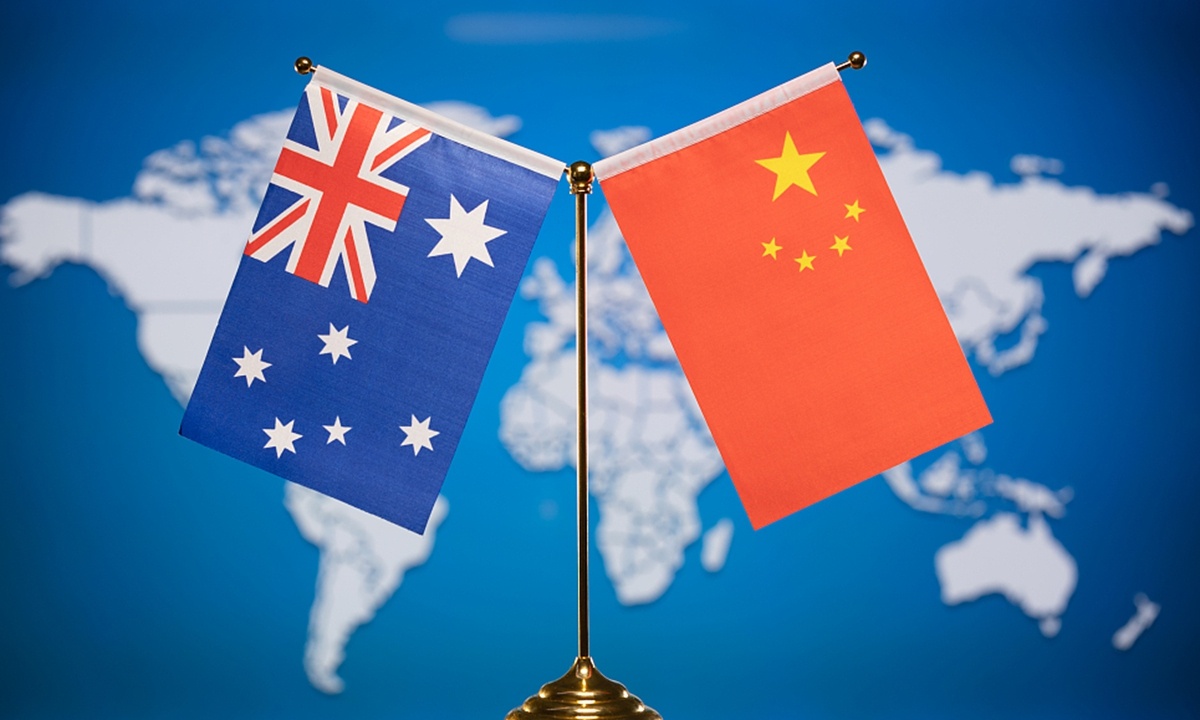
China-Australia (Photo: VCG)
Some Australian politicians' cold war mentality and ideological prejudice are taking China-Australia relations into an abyss, which observers said will have a great impact on the Australian side, dragging down trade with China by at least 1 percent by the end of 2020.
They said Australia is to blame as the country's constant provocative and discriminatory practices seriously damaged mutual trust, and they urged Australia to take concrete steps to improve ties before it is too late, instead of launching a trade war against China.
Data from the Australian Bureau of Statistics on Thursday showed that the country's exports of goods and services in total rose 5 percent to $35.7 billion in October, while imports rose 1 percent to $28.3 billion.
The numbers hint at a crisis that has been brewing for months: economic and trade relations with China, its top trade partner, are on a downward spiral.
"Bilateral trade between Australia and China may drop by 1 percent over the last two months of 2020, with agriculture, animal husbandry and the services sector to be hit the hardest," Yu Lei, a chief research fellow at the Research Center for Pacific Island Countries at Liaocheng University, told the Global Times on Thursday.
Due to the joint impact of souring ties and the global pandemic, China's imports from Australia dropped 6.1 percent year-on-year in the first 10 months to $95.8 billion, data from Chinese customs showed.
"A greater negative impact on the Australian economy could gradually emerge in 2021, given the long industry chains of the agricultural and animal husbandry sectors. For example, Australian wine packaging and bottlemakers may receive fewer orders after the grape harvest next year," Chen Hong, director of the Australian Studies Center at East China Normal University in Shanghai, told the Global Times on Thursday.
He said some observers expect the Australian economy to post a double-digit contraction in 2021. In Australia, some people worry that China might suspend imports of iron ore, which so far hasn't been affected too much because of China's large demand for its booming steel sector.
China is the largest export market overall for Australian goods and services, accounting for 32.6 percent of its total exports in 2018-19.
China is also the No.1 market for major Australian products and services, such as coal, iron ore, wine, beef, tourism and education, public data show.
There is no doubt that China is "irreplaceable" for Australia's economic growth and its people, Wang Shiming, a professor specializing in China-Australia affairs, told the Global Times.
Australia has recorded continuous growth in conjunction with China's rapid development for decades, especially after the two signed a Free Trade Agreement in 2015. Further, Australia imports large quantities of telecommunications equipment and home appliances that are indispensable for Australian families, he noted.
Amid worsening bilateral ties, Australia's demand for Chinese goods has continued to rise, according to DHgate, a leading business-to-business cross-border e-commerce platform in China. Data from the platform showed that the gross merchandise value in Australia increased 11 percent year-on-year during this year's Black Friday and Cyber Monday promotions.
Since Australia has barely made progress in expanding its markets beyond China, some Australian politicians have called for Australians to boycott Chinese products this Christmas.
"By politicizing and weaponizing economic activities, the Australian side is attempting to launch a trade war against China," Chen said, noting that "China hopes to maintain and push forward China-Australia economic and trade relations that are mutually beneficial."
Wang said that Australia's extreme ideology and practice of siding with the US to follow strict anti-China policies are fundamentally changing the friendly attitude of Chinese people toward Australia, and Chinese may gradually abandon Australian products.
Under the phase one trade deal with the US, a Chinese official said on Monday that China has completed 37 Customs quarantine protocols that allow more US agricultural products, including potatoes, poultry and pet food, into the Chinese market.
"As China is implementing its trade commitments with many countries and regions, it will of course make adjustments to its import plans. But such an act isn't targeting Australia," Chen said.
In a press briefing in November, Foreign Ministry spokesperson Zhao Lijian said that to get out of this predicament, the key lies in Australia facing squarely the crux of the current setback, seeing China's rapid development objectively, and rationally, handling bilateral relations in accordance with the principles of mutual respect and equal treatment, as well as doing more things conducive to enhancing mutual trust and promoting cooperation.


